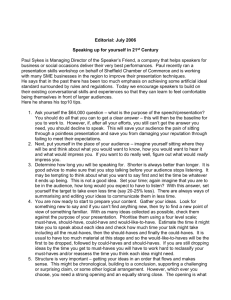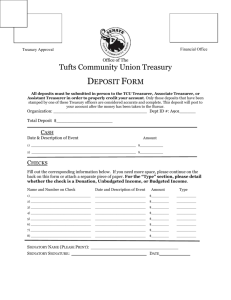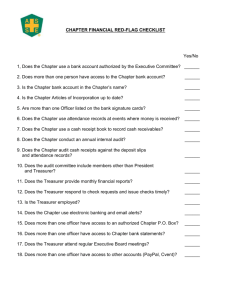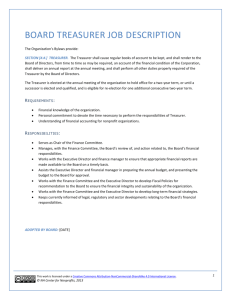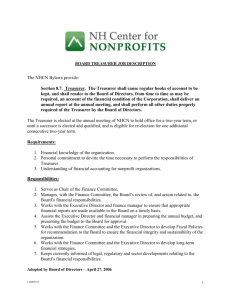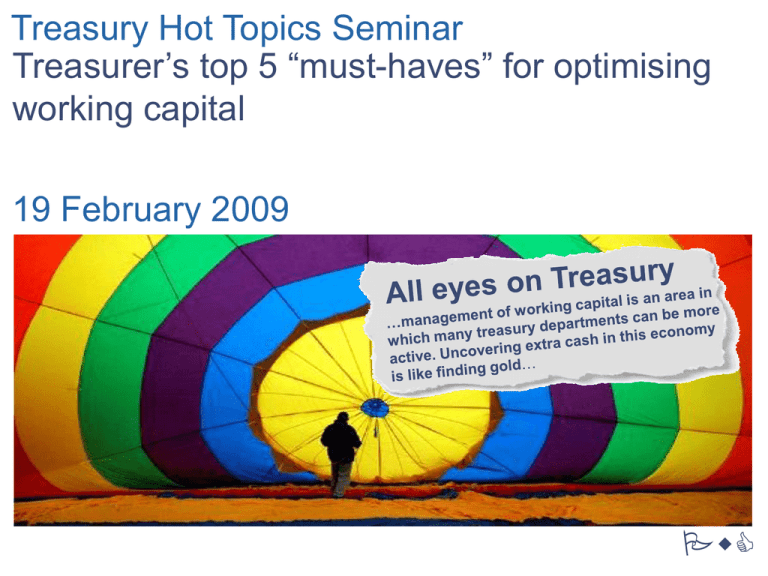
Treasury Hot Topics Seminar
Treasurer’s top 5 “must-haves” for optimising
working capital
19 February 2009
PwC
Agenda
Treasurer’s top 5 “must-haves” for optimising working capital
Audience perspective
The treasurer and working capital management
The five Must-haves
Conclusion
Q&A
PricewaterhouseCoopers
Page 2
Audience perspective
Share your point of view
Question n°1
Do you have a formal policy on working capital?
1.
2.
3.
4.
5.
Yes, we have a proper WCM policy
Yes, as part of treasury policy
Yes, as part of a credit policy
Yes, as part of another policy
No
PricewaterhouseCoopers
21%
21%
0%
21%
38%
Page 3
Audience perspective
Share your point of view
Question n°2
By which frequency do you revise this policy?
1.
2.
3.
4.
5.
More than once a year
Yearly
Every 2 – 3 years
On an ad-hoc basis
Never
PricewaterhouseCoopers
6%
12%
6%
50%
25%
Page 4
Audience perspective
Share your point of view
Question n°3a
To evaluate the working capital performance within your group, do you perform
any benchmark exercise?
1. Yes
2. No
PricewaterhouseCoopers
56%
44%
Page 5
Audience perspective
Share your point of view
Question 3b
If yes, could you specify the benchmark exercise (Yes:1 - No:2)
A.
B.
C.
D.
E.
F.
Internal (intra-group benchmark)
External (similar companies)
Quantitative (KPI’s)
Qualitative (processes)
On a divisional basis
On a geographical basis
PricewaterhouseCoopers
44%
19%
69%
6%
50%
31%
Page 6
Audience perspective
Share your point of view
Question n°4
Have Working Capital measures (such as DWC, DSO, DIO and DPO) been
established as key corporate measures? If yes, please specify the reporting
periodicity?
1.
2.
3.
4.
5.
No
Yes, monthly
Yes, weekly
Yes, quarterly
Yes, yearly
PricewaterhouseCoopers
17%
78%
0%
4%
0%
Page 7
Audience perspective
Share your point of view
Question n°5
Have these measures (such as DWC, DSO, DIO and DPO) been established
as specific targets?
1. Yes
2. No
PricewaterhouseCoopers
79%
21%
Page 8
Audience perspective
Share your point of view
Question n°6a
Does Group Treasury play a significant role in WCM
1. Yes
2. No
PricewaterhouseCoopers
70%
30%
Page 9
Audience perspective
Share your point of view
Question n°6b
If YES, what is the role of Group Treasury (Yes:1 – No:2)
A.
B.
C.
D.
E.
Pre-review of policies and procedures
Monitoring of key ratios and figures
Payment periods for inter-company sales
Payment period for third party sales
Sales channel financing solutions
PricewaterhouseCoopers
43%
79%
29%
36%
36%
Page 10
Audience perspective
Share your point of view
Question n°7
Did you have any working capital project ongoing last year?
1. Yes
2. No
PricewaterhouseCoopers
68%
32%
Page 11
Audience perspective
Share your point of view
Question n°8
What was the main focus of this WCM project?
1.
2.
3.
4.
5.
6.
7.
Receivables
Payables
Inventory
Receivables, Payables
Receivables, Payables, Inventory
Receivables, Inventory
Payables, Inventory
PricewaterhouseCoopers
26%
11%
0%
16%
37%
11%
0%
Page 12
Audience perspective
Share your point of view
Question n°9
Who in your organisation was responsible for managing this working capital
project and driving improvements?
1.
2.
3.
4.
5.
6.
Finance
Treasury
Sales
Procurement
Supply Chain / Operations
Separate WCM project manager
PricewaterhouseCoopers
53%
37%
0%
0%
5%
5%
Page 13
Audience perspective
Share your point of view
Question n°10
Did the recent credit crunch have any impact on the way your group manages
its working capital?
1. Yes
2. No
PricewaterhouseCoopers
82%
18%
Page 14
Audience perspective
Share your point of view
Thank you for your participation.
Let’s analyse your responses!
PricewaterhouseCoopers
Page 15
Agenda
Treasurer’s top 5 “must-haves” for optimising working capital
Audience perspective
The treasurer and working capital management
The five Must-haves
Conclusion
Q&A
PricewaterhouseCoopers
Page 16
The treasurer and working capital management
Working Capital Management comprises
three main elements
Balance Sheet
Stock
€m
Fixed assets
1,355
Current assets
315
Debtors
505
Debtors
Current liabilities
Customer discounts
Days Inventory
Outstanding
+
Stock
Creditors
(raw materials, WIP and
finished goods)
(283)
(money owed to us
for our products)
Days Sales
Outstanding
(47)
___
Net current assets
537
Other assets and liabilities
(35)
Creditors
Cash
Loans
Reserves / net assets
PricewaterhouseCoopers
263
(2,314)
___
(194)
___
(money we owe for
our purchases)
=
Working capital
requirement
Days Payables
Outstanding
Page 17
The treasurer and working capital management
Potential to reduce working capital can be identified in
three core processes
Key drivers
Order to Cash Cycle
Process
Orders
Verify
Creditworthiness
Issue
Invoices
Book
Account
Receivable
Cash
Collection
Purchase to Pay Cycle
Choose
suppliers;
negotiate
contracts
Order
Materials
Assess
Supplier
Performance
Process/book
Invoices
• Credit control
• Terms of payment
• Billing
• Dunning process
Pay
Invoices
• Terms of payment
• Cash discounts
• Procurement process
• Payment process
Forecast to Fulfil Cycle
Product
Development
PricewaterhouseCoopers
Sales
Forecast
Inventory
Management
Production
Planning
Delivery and
Customer
Service
•
•
•
•
Sales/production planning
Delivery service level
Replenishment times
Warehousing concept
Page 18
The treasurer and working capital management
Treasury in The Financial Value Chain (FVC)
Master
Data
Master
Data
Purchase
order
Sales
order/
Call-off
Invoice
Receipt
Scanning
Billing
Stock
mgmt
Collections
activity
Invoice
Approval
Disputes
Cash in
Sales process
PricewaterhouseCoopers
Cash
out
Classic
Treasury
Procurements process
Page 19
Agenda
Treasurer’s top 5 “must-haves” for optimising working capital
Audience perspective
The treasurer and working capital management
The five Must-haves
Conclusion
Q&A
PricewaterhouseCoopers
Page 20
The 5 must-haves
1. Working Capital Policy
Formalise and consolidate key levers of working capital
Objective
• Formalise key policies regarding working capital
• Framework for centralising all relevant procedures regarding key levers
• Documented guideline of exception handling, eg. regarding payment terms
different from general terms and conditions
Outcome
• Consideration of working capital from end-to-end perspective
• Create transparency and consistency in approach
• Use as tool to overcome cross-divisional boundaries
(Treasury/Sales/Procurement/Supply Chain)
• Create sensibility for cash across group and create understanding of
working capital and its key drivers for non-finance staff
PricewaterhouseCoopers
Page 21
The 5 must-haves
1. Working Capital Policy
WCM policy content
Typical topics
• Group-wide definition of ratios and KPIs
• Targets on appropriate level of working capital
• Roles and responsibilities
• Monitoring measures to ensure compliance
• Links to credit policy, purchasing policy and T&C
PricewaterhouseCoopers
Page 22
The 5 must-haves
1. Working Capital Policy
Treasurer must-haves
Treasurer’s role:
• Initiate/improve the WCM policy based on your
treasury policy experience
PricewaterhouseCoopers
Page 23
The 5 must-haves
2. Cash Flow Forecasting
Critical Success Factors to Effective Forecasting
Methodology
Consensus on the
approach to
forecasting
Clear Objectives
Objectives of the
forecast are clear
Harmonized
Forecasts
Ensure that other
related forecasts
concur
PricewaterhouseCoopers
Information
Availability
Attain access to
required data,
particularly at
divisional level
Effective
Cash
Forecasting
Accurate
Information
Ensure reported
information is reliable
and accurate
Culture
Foster an
environment stressing
the importance of
financial and cash
flow management
Systems
Required system
infrastructure is
critical to success
Training
Provide training and
communication
around forecast
objectives and
process
Page 24
The 5 must-haves
2. Cash Flow Forecasting
Treasurer = ideal person to assess best appropriate tool
Approaches that could be considered when addressing cash forecast systems
requirements:
•
•
•
•
Excel-based model
Consolidation tool
Current ERP environment (Oracle, SAP)
Treasury systems including cash forecast functionality and variance
analysis capabilities
Treasury System selection process very similar to CFF tool.
PricewaterhouseCoopers
Page 25
The 5 must-haves
2. Cash Flow Forecasting
Best practices
•
•
•
•
•
•
•
Measure forecasting accuracy
Use forecasts to identify areas for operational improvement
Keep forecasts simple
Centralize coordination of forecasts
Integrate forecasting system with its inputs and automate forecast
generation/ reporting
Consider historical cash inflows and outflows
Ensure Business Units frequently provide timely and accurate information
PricewaterhouseCoopers
Page 26
The 5 must-haves
2. Cash Flow Forecasting
Treasurer must-haves
Treasurer’s role:
• Ensuring all sales & purchases are captured in cash flow
forecasts
• Ensuring all billing adjustments, disputes and collection
issues are reflected in cash flow forecasts
• Drive accuracy improvements of forecasts by analyse
variances
• Independent reporting of working capital KPIs
PricewaterhouseCoopers
Page 27
The 5 must-haves
3. Working capital dashboard
Create visibility on key metrics
Cash Flow
Forecasting
Detail view of working
capital levers, KPIs and
ratios
Re-use data sources of
cash flow forecast
Working Capital dashboard
Working Capital
policy
Closely monitor set
progress on targets set
within policy
Use definition of groupwide definitions
Objectives
• Creating visibility on key metrics for working capital within reporting periods
• Providing consistency in underlying calculation methods to ensure comparability
• Understanding effect of working capital balance on treasury elements
• Enabling the monitoring of key working capital levers
PricewaterhouseCoopers
Page 28
The 5 must-haves
3. Working capital dashboard
Treasurer must have
Treasurer’s role:
• Define working capital metrics and KPIs used
across the group
• Independent reporting of working capital KPIs
• Drive accuracy improvements
PricewaterhouseCoopers
Page 29
The 5 must-haves
4. Supply Chain financing
Squeezing supplier terms has its limits
• Market position determine outcome of payment
terms negotiations
• One-sided opportunity calculation
Example: EADS
• 2000 tier 1 suppliers for Airbus alone in 2007
• Consider impact of supplier bankruptcy on
supply chain
• Set-up of own team responsible for monitoring of
financial health of suppliers
• Leverage own credit rating to secure financing
for suppliers
PricewaterhouseCoopers
Page 30
The 5 must-haves
4. Supply Chain financing
Reversed factoring in general
2. Assignment / factoring of invoices
3. Immediately payment of invoice
Supplier
1. Delivery of the
services/
goods
Bank
Assignment acknowledgment
Client
4. Longer term payment date
Benefit: The client receives better paying terms compared to the terms the
supplier would have been able to grant without reversed factoring.
PricewaterhouseCoopers
Page 31
The 5 must-haves
4. Supply Chain financing
Treasurer must-haves
Treasurer’s role:
• Provide input to procurement on possible financing
options
• As the treasurer manages the bank relationship, he
acts as a middle man between purchasing
department and banks
PricewaterhouseCoopers
Page 32
The 5 must-haves
5. Manage your payment terms
Early settlement discount and cost of capital
Price discount
Number of days paid earlier
5
10
15
20
25
30
35
40
45
50
0.50%
36.50%
18.25%
12.17%
9.13%
7.30%
6.08%
5.21%
4.56%
4.06%
3.65%
0.75%
54.75%
27.38%
18.25%
13.69%
10.95%
9.13%
7.82%
6.84%
6.08%
5.48%
1.00%
73.00%
36.50%
24.33%
18.25%
14.60%
12.17%
10.43%
9.13%
8.11%
7.30%
1.25%
91.25%
45.63%
30.42%
22.81%
18.25%
15.21%
13.04%
11.41%
10.14%
9.13%
1.50%
109.50%
54.75%
36.50%
27.38%
21.90%
18.25%
15.64%
13.69%
12.17%
10.95%
1.75%
127.75%
63.88%
42.58%
31.94%
25.55%
21.29%
18.25%
15.97%
14.19%
12.78%
2.00%
146.00%
73.00%
48.67%
36.50%
29.20%
24.33%
20.86%
18.25%
16.22%
14.60%
2.25%
164.25%
82.13%
54.75%
41.06%
32.85%
27.38%
23.46%
20.53%
18.25%
16.43%
2.50%
182.50%
91.25%
60.83%
45.63%
36.50%
30.42%
26.07%
22.81%
20.28%
18.25%
2.75%
200.75%
100.38%
66.92%
50.19%
40.15%
33.46%
28.68%
25.09%
22.31%
20.08%
3.00%
219.00%
109.50%
73.00%
54.75%
43.80%
36.50%
31.29%
27.38%
24.33%
21.90%
3.25%
237.25%
118.63%
79.08%
59.31%
47.45%
39.54%
33.89%
29.66%
26.36%
23.73%
3.50%
255.50%
127.75%
85.17%
63.88%
51.10%
42.58%
36.50%
31.94%
28.39%
25.55%
The discount equivalent for a 2/10 Net 30 is 36.50%
PricewaterhouseCoopers
Page 33
The 5 must-haves
5. Manage your payment terms
Early settlement discount vs Dynamic Discounting
Early Settlement Discount: Traditional process issues
• Traditional discount terms of 2/10, Net 30 are rigid
• Buyers often take discounts, even if they don’t pay within 10 day
window
• It’s all or nothing: full discount on day 10, zero discount on day 11
• 2% discount to accelerate payment by 20 days is expensive for
suppliers with good liquidity and access to cheaper sources of cash
Dynamic Discounting
• Discount rates are proportional to days payments are accelerated
• Predictable early electronic payment (direct debit) provided in
exchange for early payment discount
• Depending on the provider, additional features include option for
supplier to request early payment with ‘dynamic discount’
PricewaterhouseCoopers
Page 34
The 5 must-haves
5. Manage your payment terms
Dynamic Discounting
Discount
Early Settlement
Discount
2%
Dynamic Discount
Normal invoice payment cycle
Days to Payment
PricewaterhouseCoopers
10
20
30
Page 35
The 5 must-haves
5. Manage your payment terms
Treasurer must-haves
Treasurer’s role:
• Know your WACC to make trade-off
• Key role in establishing baseline calculation for
Sales and Purchasing and communicate
• Update regularly
• Payment terms always come at a price
• Consider impact of payment methods
PricewaterhouseCoopers
Page 36
The 5 must-haves
The treasurer can play a key role in managing
working capital
1. Working Capital
Policy
3. WC Dashboard
2. CFF
PricewaterhouseCoopers
5. Supply chain
financing
4. PT management
Page 37
Agenda
Treasurer’s top 5 “must-haves” for optimising working capital
Audience perspective
The treasurer and working capital management
The five Must-haves
Conclusions
Q&A
PricewaterhouseCoopers
Page 38
Building a business case for WCM
Treasury is always impacted by poor WCM.
Why not take increased control of the FVC?
Increased involvement and/ or visibility of the FVC will give the treasurer
advanced warning and increased control in his role as a provider of Working
Capital
Increased control will allow the treasurer to help reduce the over all Working
Capital Requirement
Business case as an
accelerator for change?
PricewaterhouseCoopers
Page 39
Thank you!
Didier Vandenhaute
Didier.vandenhaute@pwc.be
Phone +32 2 710 9634
Mobile +32 475 91 06 78
Fax +32 710 7224
Martin Böhme
Martin.bohme@pwc.be
Phone +32 2 710 7527
Mobile +32 493 24 04 00
Fax +32 710 72 24
© 2006 PricewaterhouseCoopers. All rights reserved. “PricewaterhouseCoopers” refers to the network
of member firms of PricewaterhouseCoopers International Limited, each of which is a separate and
independent legal entity. *connectedthinking is a trademark of PricewaterhouseCoopers.
PwC


